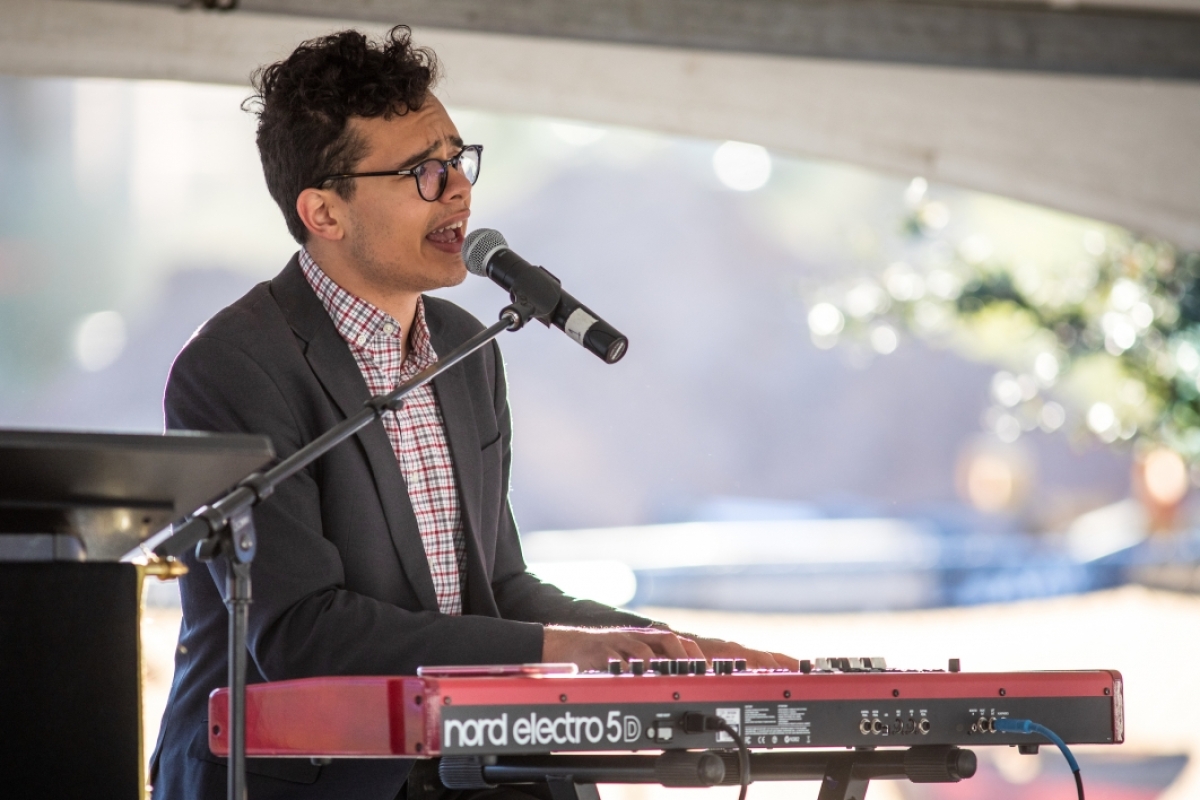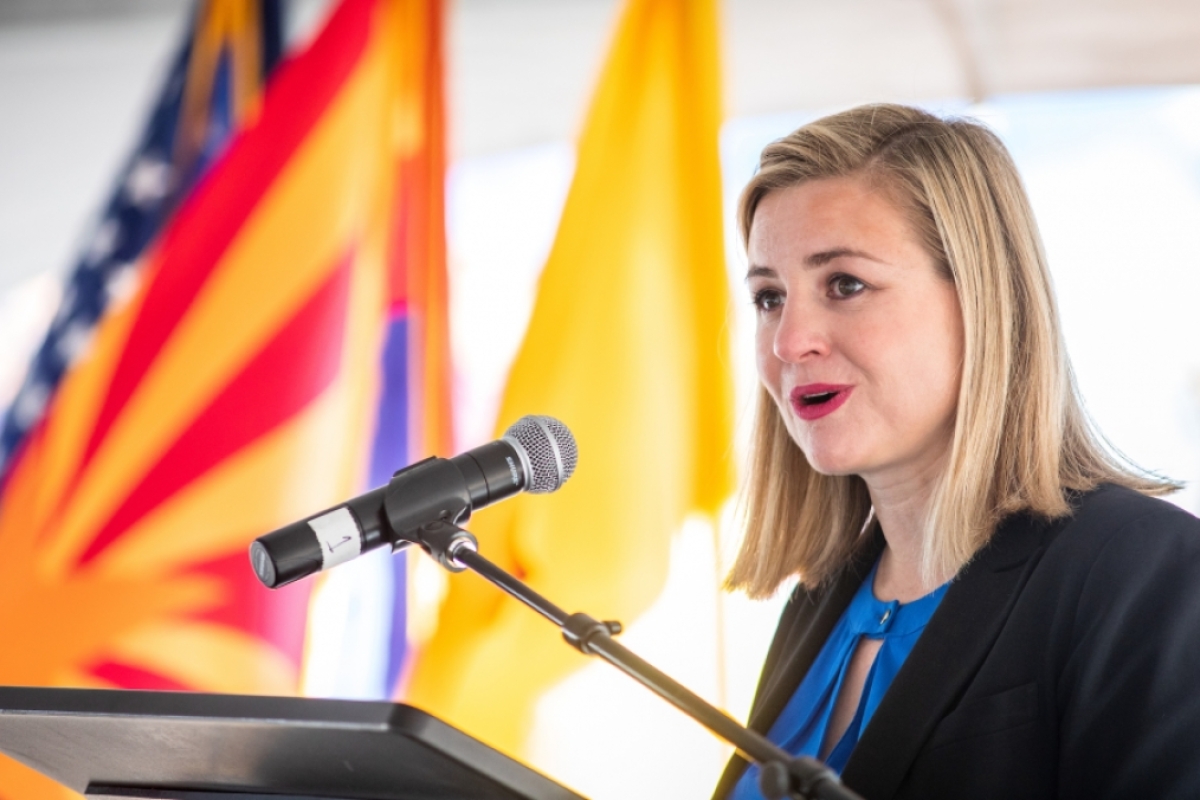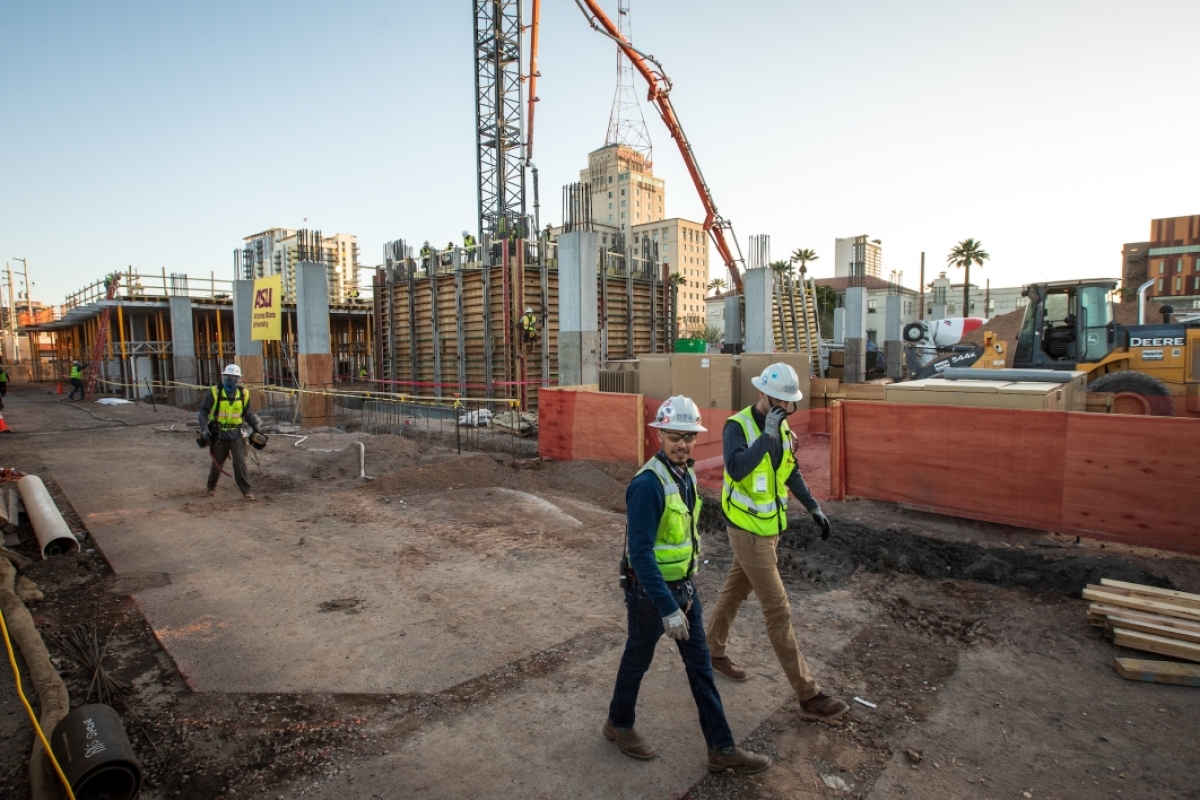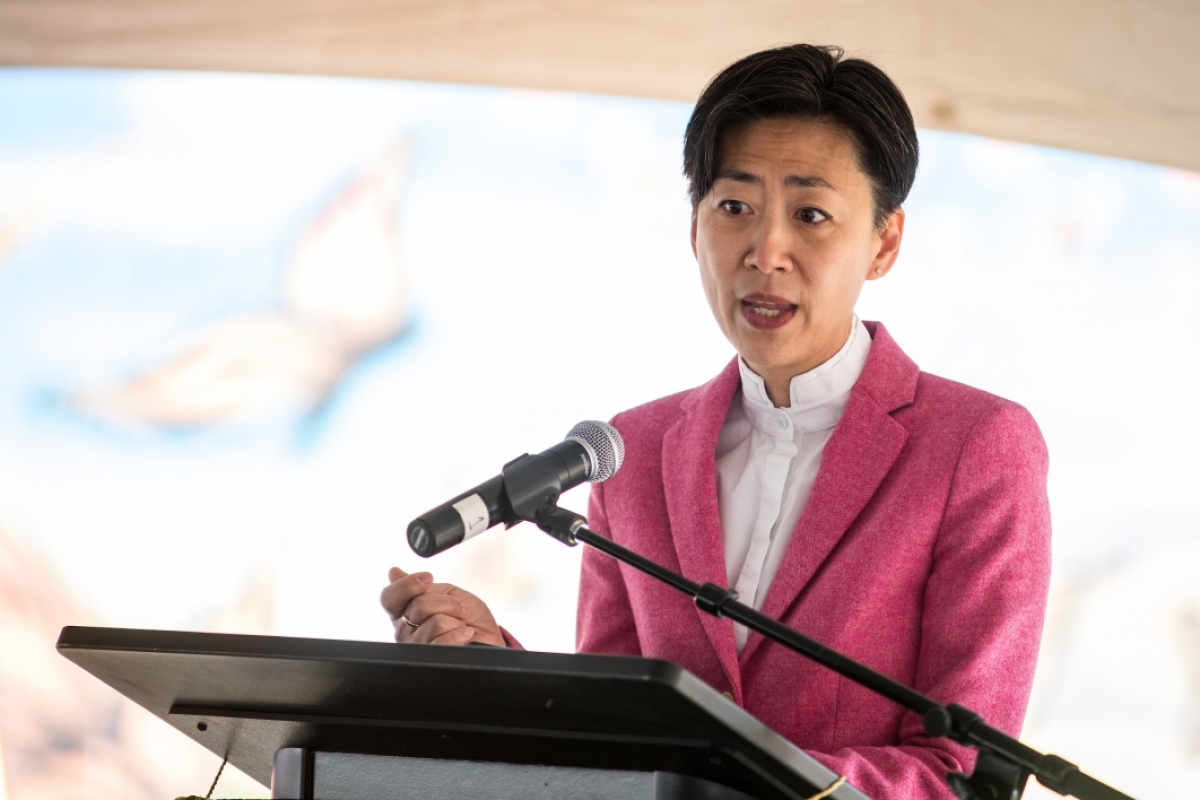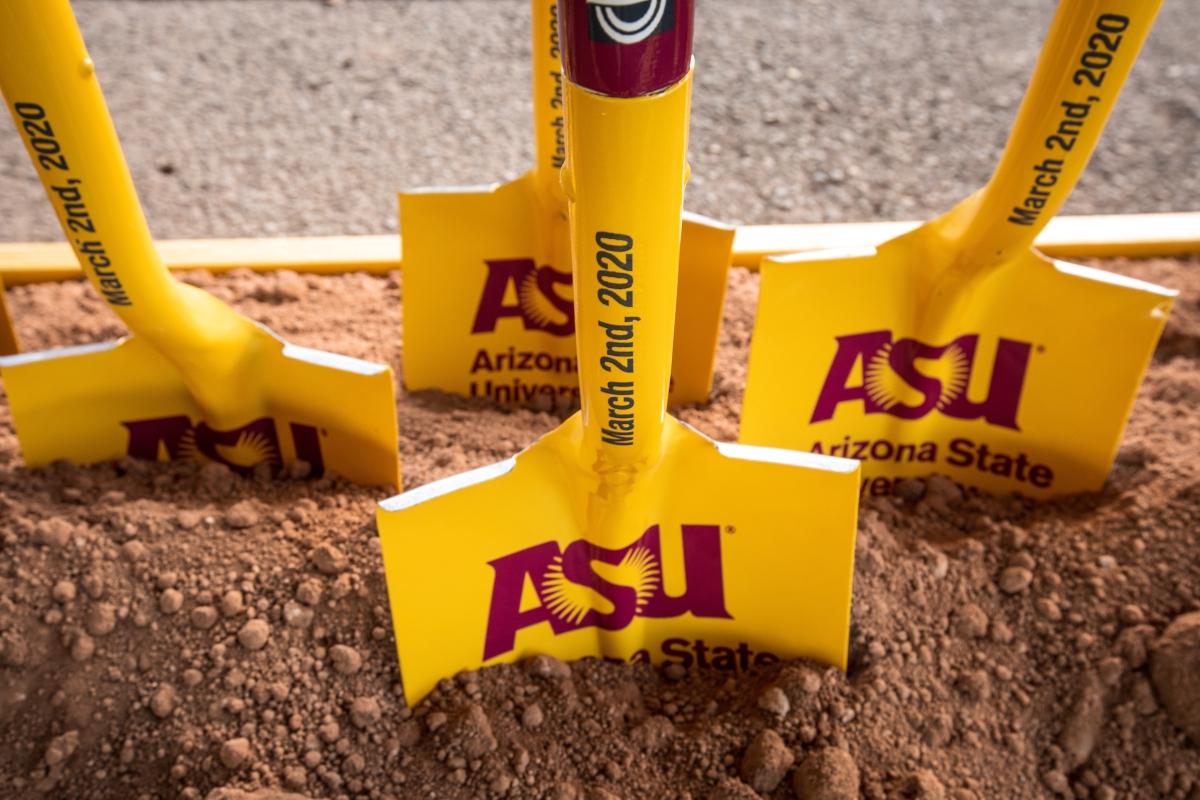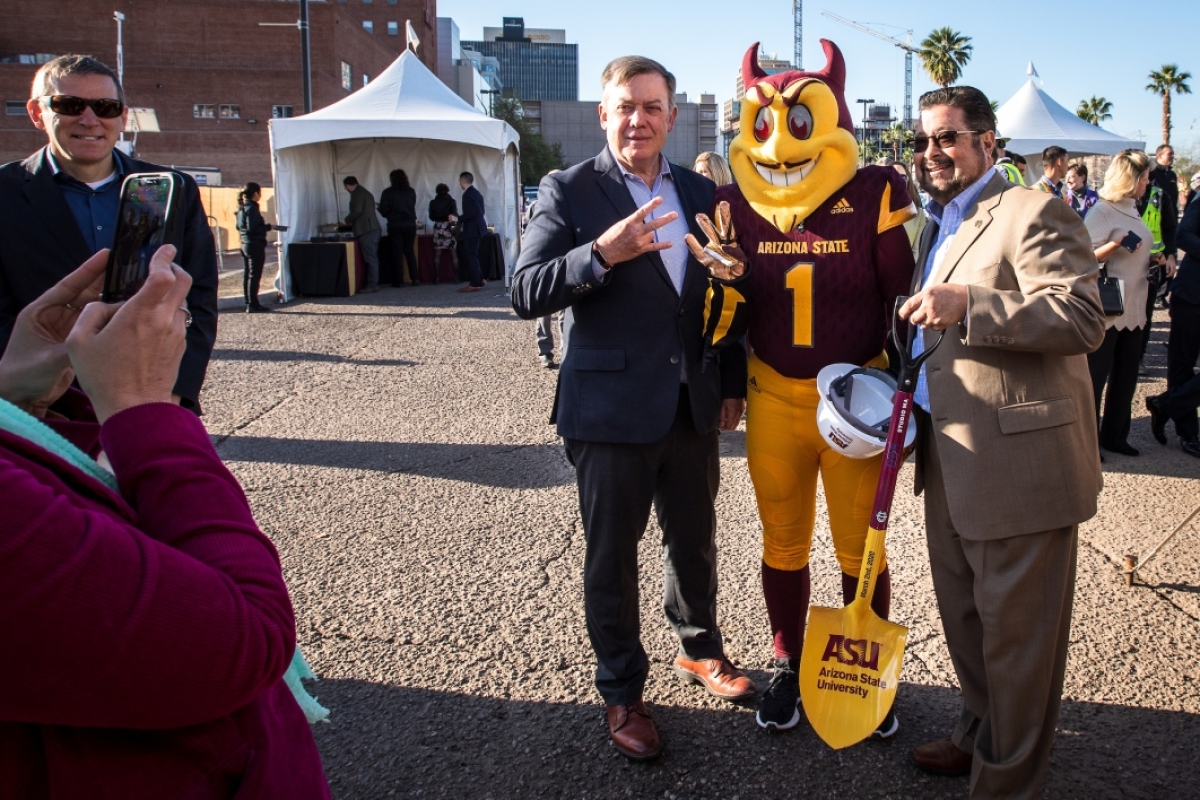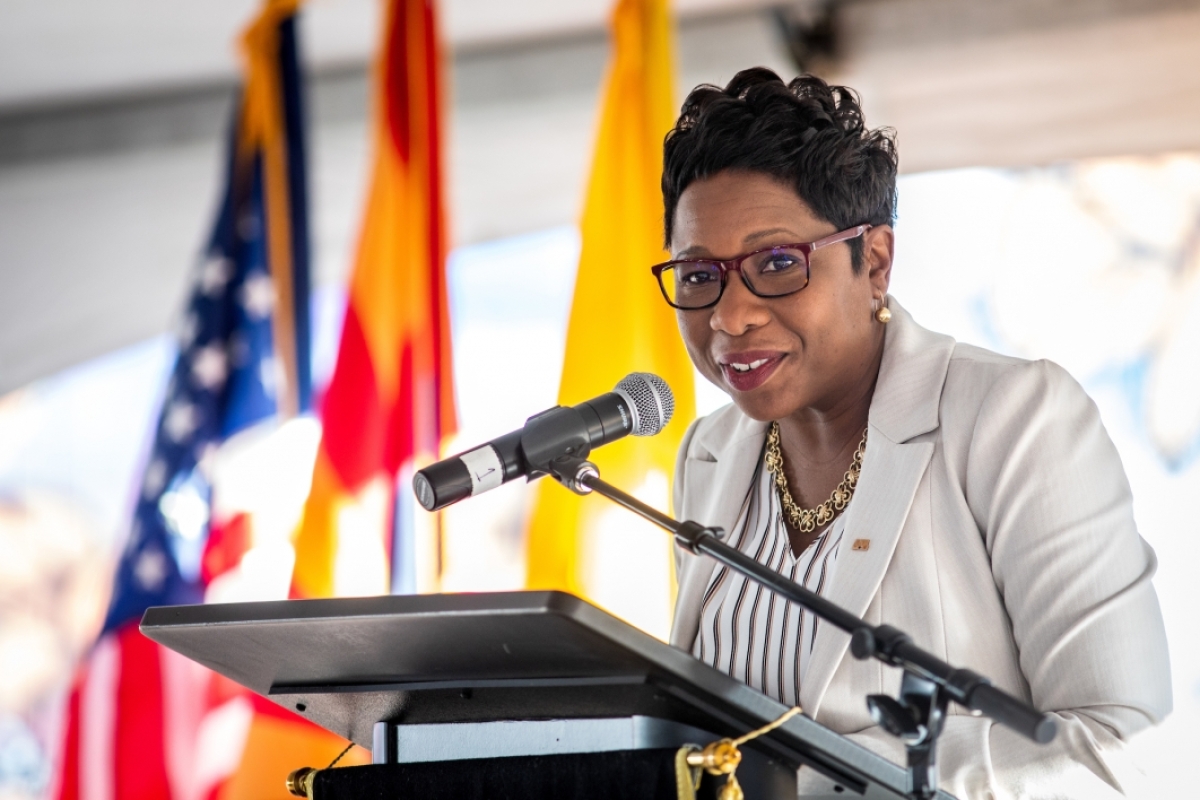ASU breaks ground on 2nd downtown residence hall with focus on entrepreneurship and the arts
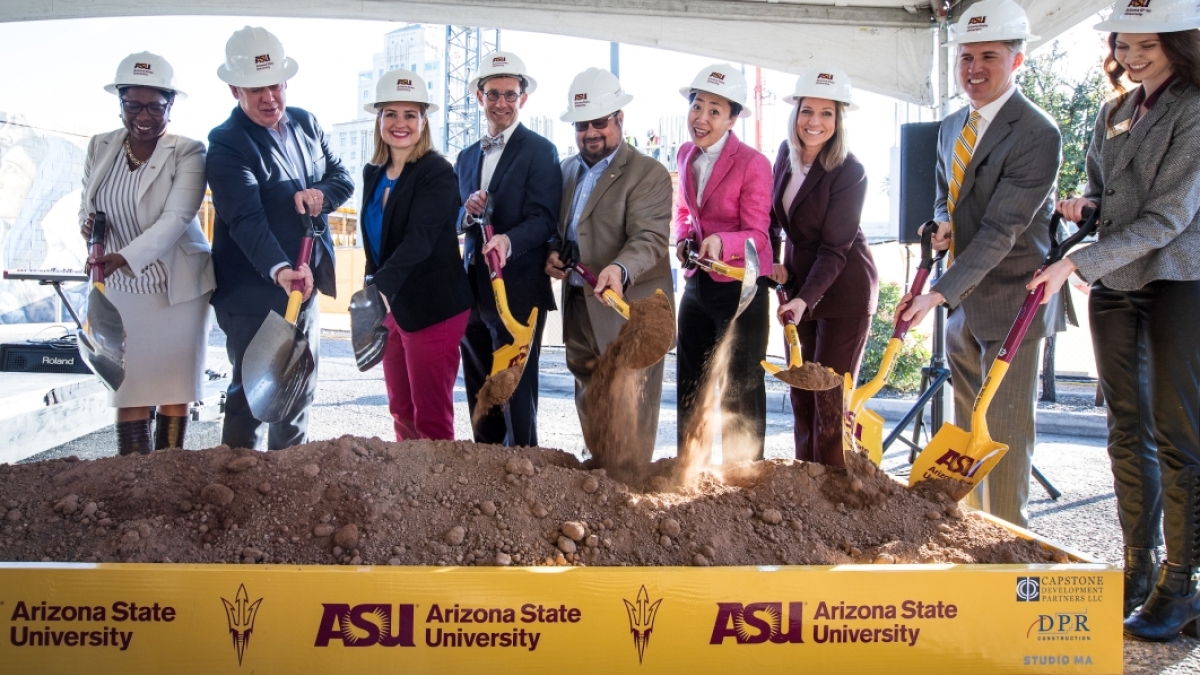
Editor’s note: This story is being highlighted in ASU Now’s year in review. Read more top stories from 2020.
Arizona State University broke ground Monday on the Downtown Phoenix Residence Hall and Entrepreneurship Center, a 16-floor building at the southwest corner of Fillmore Street and First Avenue.
The 283,000-square-foot project, expected to open in fall 2021, will house more than 500 students in the top 13 floors. The first three floors will offer academic space for the Herberger Institute for Design and the Arts programs in popular music, fashion and design. It also will add to the Valleywide network of ASU Entrepreneurship and Innovation co-working, event and exhibition spaces for students, staff, faculty and the community.
“The skyline of Phoenix is getting smarter today,” said Phoenix Mayor Kate Gallego, noting that the new center will be the largest ASU building in Phoenix.
She attributed the resurgence of the city’s downtown to two factors: light rail and ASU’s campus.
“They have really changed the face of downtown and made it the vibrant community that we have today,” said Gallego, who noted that there are currently 14 buildings under construction downtown, with another 14 expected in the next 18 months.
“We have doubled the population in downtown in the last five years, and with ASU’s help, we hope to do it again in five years,” she said.
The population at the Downtown Phoenix campus has increased 47% over the past decade, with 11,420 students for the fall 2019 semester. The opening of the new Thunderbird School for Global Management facility in fall 2021, the transfer of several Herberger Institute programs from the Tempe campus, and predicted enrollment growth are all driving the need for more housing.
The Downtown Phoenix Residence Hall and Entrepreneurship Center will be the first new residential space on the Downtown Phoenix campus since Taylor Place, which opened in fall 2008 and is at capacity with more than 1,200 students. The new building will provide 532 beds in studio, two-bedroom and four-bedroom apartment-style units for graduate students and sophomore-and-above undergraduates. The lease rates will be comparable to Taylor Place, and the units will be furnished and include all utilities and services.
ASU President Michael Crow said that the new center is furthering ASU’s mission to be embedded in the community.
“We took the walls down from the university, we spread the university and began working with community leaders, in this case our stalwart partners, the city of Phoenix, which has invested in every project and enabled us to move forward,” he said.
“Imagine that out of this residence hall comes musical enterprises, social enterprises, business enterprises, creative enterprises, artistic enterprises — all the things that make for a rich and robust Phoenix and Arizona.”
Crow sees ASU greatly expanding its presence in Phoenix.
“I would guess we’re somewhere between 2% and 4% of what will eventually be the evolved downtown campus,” he said.
“We’re just getting started. We have hundreds of ways that our students can become engaged with the community that will grow to thousands or even tens of thousands of ways.”
The Entrepreneurship and Innovation space on the first floor of the center will provide a “front door” to the downtown Phoenix entrepreneurial community, according to Ji Mi Choi, associate vice president of entrepreneurship and innovation at ASU.
“If I looked at the hotbeds of entrepreneurship, downtown Phoenix is certainly one of them. And now we’ll be able to draw from and have access to the warehouse district and things that are coming out of Galvanize and our partners at the Greater Phoenix Economic Council,” she said.
The center will have gathering space, collaborative workspaces, a makerspace and a pop-up retail opportunity in a spot that’s visible to the street as a kind of “storefront.”
“This will showcase products from our students, including those who are part of academic programs like fashion,” Choi said.
“We’re looking forward to a continued partnership with the university’s Auxiliary Business Services team, who have been so supportive of our Retail Devils,” in which members of the Venture Devils program were able to sell products in the ASU bookstores.
The E+I programming in the new center will connect with programs already at the downtown campus, including the New Media Innovation and Entrepreneurship Lab in the Cronkite School of Journalism and Mass Communication; the HEALab, a collaboration between E+I, the Edson College of Nursing and Health Innovation and the College of Health Solutions; and the PBC Innovation Center, which also will have specialized entrepreneurship space.
The center also will include training spaces to host workshops, seminars, boot camps and meetups.
“When you connect that with the overall lobby event space, we can accommodate from 100 to 500 people. We would imagine being able to host our pitch playoff and Demo Day events there,” Choi said.
At the groundbreaking, Steven Tepper, dean of the Herberger Institute, said that the center will enhance cross-disciplinary enterprises.
“Imagine designing a line of clothing influenced by the musicians and architects and entrepreneurs with whom you share conversation,” he said.
“Imagine fabricating that line of clothing in a state-of-the-art makerspace. Imagine walking downstairs and opening a boutique retail store to sell the clothing.”
Tepper said that in 2015, the arts added more than $9 billion to Arizona’s economy.
“Imagine that with almost 1,000 Herberger Institute students downtown within the next three to five years, ASU can serve as a catalyst for Phoenix’s rise as a creative city,” he said.
"We want our students to be part of the excitement of downtown. We want them to be near Roosevelt Row, Grand Avenue, the Warehouse District and other central Phoenix arts institutions. We want them to have access to the museums and music venues and creative enterprises."
The new center will house the Herberger Institute’s new popular music program in the School of Music, which is now accepting applications and will be based on the Tempe campus the first year. The downtown center will have two recording studios, a digital audio learning lab, a green-screen video room, rehearsal rooms and a performing space. The degree is for students interested in becoming singers, songwriters, laptop performers or composers, producers, engineers or entrepreneurs in the entertainment world.
Also downtown will be the fashion program, which in three years has grown to about 475 students who are either majoring or minoring in fashion, according to Dennita Sewell, director of the fashion design program and a professor of practice.
“The downtown campus will place the fashion students in the heart of the arts and culture hub of the Valley, fostering opportunities to expand their creativity and professional networks,” Sewell said.
“An expanded fashion studio will provide the dynamically growing program with industry-level facilities that will empower students’ creativity and nurture their growth.”
The $116 million project is a public-private partnership in which ASU is leasing the land to Downtown Phoenix Student Housing II, LLC, which contracted with Capstone to build and manage the center. Downtown Phoenix Student Housing will pay rent to ASU, which will be responsible for operations and maintenance.
Top photo: ASU, city of Phoenix and Capstone Development Partnership members turn the ceremonial first shovels-full of dirt at the groundbreaking Monday of the new ASU Downtown Residence Hall and Entrepreneurship Center, the university' largest building downtown. Photo by Charlie Leight/ASU Now
More Arts, humanities and education

ASU professor's project helps students learn complex topics
One of Arizona State University’s top professors is using her signature research project to improve how college students learn science, technology, engineering, math and medicine.Micki Chi, who is a…

Award-winning playwright shares her scriptwriting process with ASU students
Actions speak louder than words. That’s why award-winning playwright Y York is workshopping her latest play, "Becoming Awesome," with actors at Arizona State University this week. “I want…

Exceeding great expectations in downtown Mesa
Anyone visiting downtown Mesa over the past couple of years has a lot to rave about: The bevy of restaurants, unique local shops, entertainment venues and inviting spaces that beg for attention from…


